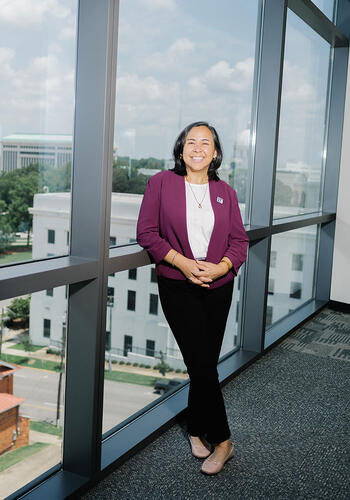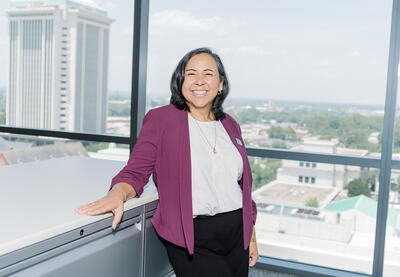Margaret Huang, president and chief executive officer of the Southern Poverty Law Center (SPLC) and the SPLC Action Fund, took time to share her thoughts with Learning for Justice on the role of public education in building a multiracial, inclusive democracy to advance the human rights of all people.
Huang, an experienced human rights and racial justice advocate, has spent her career challenging discrimination and fighting to protect the human rights of those who have been marginalized and oppressed, both internationally and in the United States.
We often frame civic action in relation to the values of a democracy, but we don’t always clearly define those values. What are democratic values? And how would you describe the SPLC’s vision of a multiracial, inclusive democracy?
The values at the heart of a multiracial, inclusive democracy are freedom of expression and assembly and authentic representation of the communities our democracy serves. The leaders we elect should not just hold office to put forward their own interests but to meaningfully advance the interests of everyone in their jurisdiction. All of those values necessitate active participation of the people. Democracy can only thrive when we fuel it with our voices, votes and healthy discussion and debate about how we move the country forward.
“This rising anti-democracy threat presents an opportunity to remind the U.S. government of its obligation to finally redress the scourge of white supremacy in our past—because only in healing those wounds can we build a multiracial, inclusive democracy to lead us into the future.”
A central tenet of democracy should be the protection of the minority. While the majority will often make decisions, the rights of the minority must be respected in any outcomes sought. Sadly, we’re in a deeply troubling moment when white Republican legislators and supermajorities in Southern statehouses are trying to deny voters of color fair representation in government and assert partisan control over the power of local elected officials—often officials who are Black, as happened recently in my home state of Tennessee.
After Reps. Justin Jones and Justin Pearson joined thousands of young people inside the Tennessee Capitol for a historic protest following a horrific school shooting, the white majority in the state House of Representatives wasted no time in dredging up Jim Crow tactics to smear and expel them. Thankfully, both were reappointed to their seats. But it is a disturbing reminder of what happens when lawmakers abandon democratic norms and shamelessly silence minority voices.
The SPLC is fighting to bring the values of a just and inclusive democracy to states in the Deep South where current political leaders would rather entrench a political system rife with racism and unequal representation. It will take all of us, but we believe the South is ripe for transformational change—and together we can achieve it.
In the Fall 2022 issue of Learning for Justice magazine, LFJ Director Jalaya Liles Dunn emphasized that from the beginning of a limited form of democracy in the United States, abolitionists and activists challenged the institution to expand, and that struggle has been foundational to our country. In what ways is the movement to expand democracy—the application of rights and responsibilities to communities the founders of our democracy did not include—continuing today? In what ways is the movement currently under attack, and what does that mean for the nation?
We’re in a time of regression. Here in the South and across the country, white supremacists are growing bolder. And Republican lawmakers are attempting to manipulate the levers of power to silence Black, Native and other voters of color and challenge free and fair elections.
We’ve also learned the hard way that progress can be reversed—that rights can be rescinded. When the U.S. Supreme Court overturned Roe v. Wade more than one year ago, the Court signaled that if the right to abortion can fall, so too can other rights we’ve long held as unassailable. Roe was a major step in advancing women’s rights as equals and our right to control our own bodies. No one thought we would again be debating people’s access to safe and legal abortion, let alone witnessing state after state across the South pass dangerous, near-total bans on the procedure.

These same state legislators have also turned their attention toward restricting medical care for trans youth and adults, removing Black history and the histories of other communities from our schools, and stifling free speech and political protest. These fights are all connected. When our rights are under fire, so too is our democracy. When our bodies are under threat, so too is our ability to live freely and with dignity.
It’s a scary time, to be sure. But it’s also a time of great possibility. I’m especially inspired by younger activists who don’t see the divisions between communities the way older generations have. When I look across our movement today, I see so many people of different races, genders, sexual orientations, abilities and backgrounds showing up as allies for one another in the fight for justice and liberation. It seems to me that young people don’t start from a place of assuming difference; instead, they start from a place of assuming equality and then challenge any notions that go against it. This brings me hope, and I’m excited that we’re tapping into the wisdom and energy of many generations to guide the fight ahead for our democracy.
In building a multiracial, inclusive democracy, what is the role of education in general and civics education in particular? What do people need to know and be able to do for responsible civic engagement that supports democracy?
I want to first acknowledge some important history about the origins of public education in our country. After the Civil War, during Reconstruction, Black men were granted their right to vote, and historians estimate that about 2,000 Black legislators were elected to public office at all levels of government. One of the most extraordinary legacies of their leadership was the establishment of universal public education across the country, including the building of integrated schools. They understood that if they were going to help Black Americans—both young and old—and new immigrants and others become fully integrated, everyone had to start from a foundation of learning, especially about our democracy. Education was the key to freedom.
It’s no coincidence that today we’re seeing Republican lawmakers in the South curtail voting rights, free speech and protest at the same time that they’re attacking public education. In the last two years alone, Republican state legislators have introduced or passed hundreds of bills to impose ignorance in our schools. They’re trying to deny students of all backgrounds the opportunity to access a whole and truthful telling of our history.
Growing up in East Tennessee, I never saw my Chinese heritage reflected in textbooks or classroom lessons in the small public school I attended. In fact, I never learned anything about Asian American history at all until I moved to Washington, D.C., for college, and I’m still learning so much about my own community’s history today.
No student should feel erased by their education. From their earliest years they should see themselves reflected in the American story. It is essential for the health of our communities and our democracy that our classrooms promote justice, give students the knowledge and resources to exercise critical thinking, and equip educators with the best tools to guide them. Educating our next generation of leaders about where we’ve been and how far we have to go is our best hope for realizing a just and equitable future.
The struggle to protect and expand democracy to benefit all people and counter oppression and injustice is a global movement. We’ve seen many of the same attacks on democratic principles and institutions happening in countries around the world—with some of those anti-democracy movements funded by organizers in the United States. In what ways does an understanding of the fight for international human rights relate to the ongoing movement for democracy in the U.S.?
Like William Faulkner said, “The past is never dead. It’s not even past.” In some ways, the United States’ experience is unique. More than many other countries, we have an obsession with racial identity—a legacy of long-standing racism, rooted in centuries of racial violence and exclusion, that we are unwilling to fully address and atone for.
From the early days of the international human rights system at the United Nations and other institutions, the United States has always taken a position of exceptionalism—that the U.S. government only respects those rights recognized under domestic laws. Even though our government has often championed some of the most significant international human rights treaties and agreements, they’ve also thwarted their domestic application at the same time, much to our own detriment.
When we look to examples from other countries, it’s clear that every country has followed its own path toward reconciling its past and building a better future, from decolonizing to drafting new constitutions to promoting collective healing and reparations, some with greater success than others. And as we confront this growing movement of authoritarianism across the globe, I try to remember how the principles of human rights resonate with people in every part of the world. There is something intrinsic in our human nature that believes we’re entitled to basic rights and freedom.
This rising anti-democracy threat presents an opportunity to remind the U.S. government of its obligation to finally redress the scourge of white supremacy in our past—because only in healing those wounds can we build a multiracial, inclusive democracy to lead us into the future. And this moment also offers an opportunity to align with the rest of the world and ratify international human rights treaties here at home. The SPLC and other civil and human rights groups are advocating for a national human rights institution that would be charged with making sure that we live up to our principles within our own borders.
